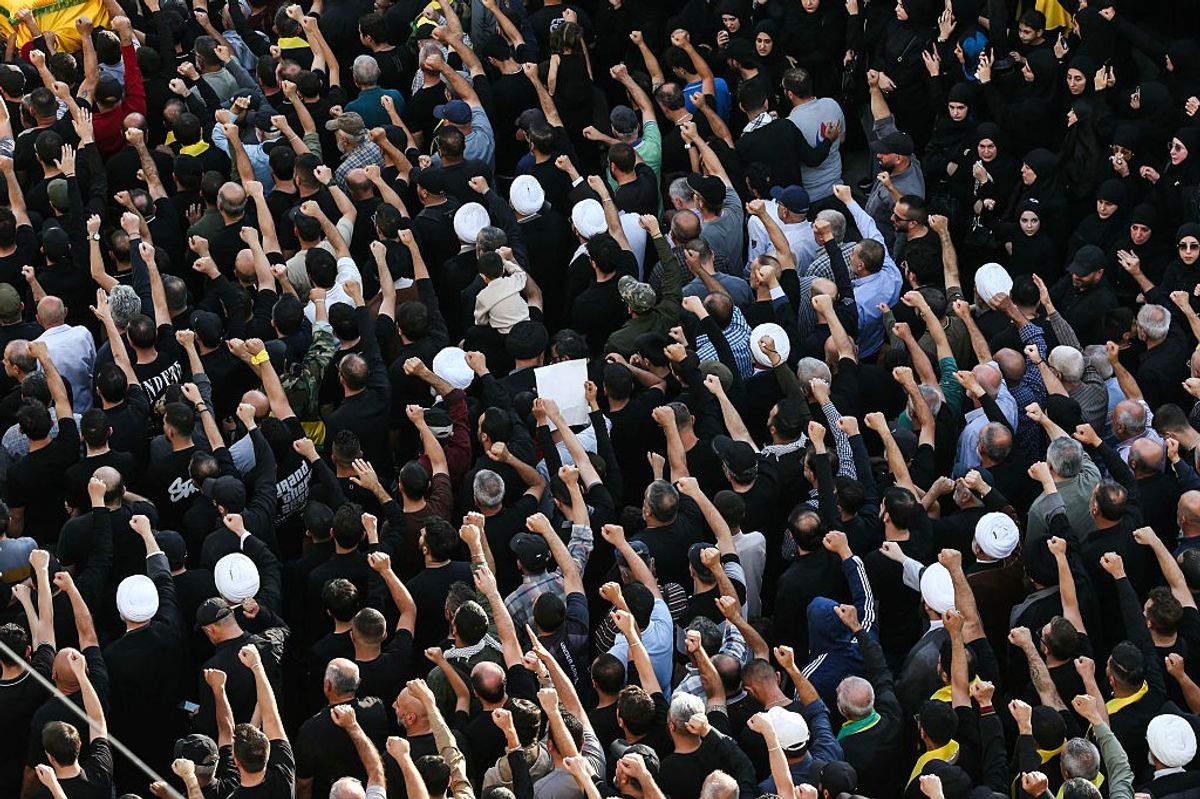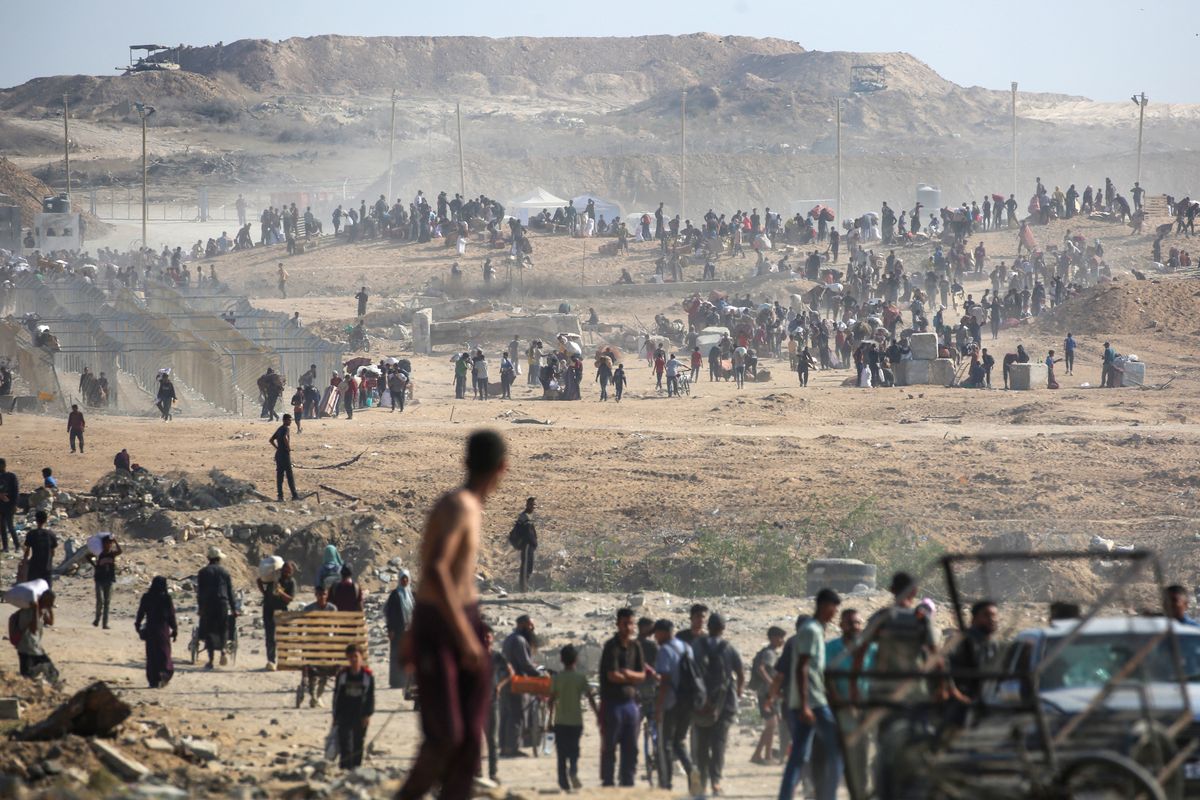SUBSCRIBER+ EXCLUSIVE REPORTING — Has Israel decided on a new war? Late Tuesday, the Israeli Defense Forces (IDF) said that plans for an attack against the Iran-backed Hezbollah group had been approved, and that the army had taken measures to "accelerate readiness in the field." Israeli Foreign Minister Israel Katz wrote in a post on X that "we are very close to the moment of decision to change the rules against Hezbollah and Lebanon. In an all-out war, Hezbollah will be destroyed and Lebanon will be severely hit."
That decision would open a major second front just over 100 miles north of Gaza, where a steady exchange of missiles and air attacks between Israel and Hezbollah has been gaining in intensity since October. In Israel, the attacks have forced some 90,000 people from their homes, ignited large forest fires, and shut down Northern Israel’s economy.
Israel faces a stark choice: Proceed with that new front against Hezbollah – whose leaders and fighters are bent on destroying Israel; or hold back on full-scale war, continue the tit-for-tat exchanges, and hope that diplomacy and the low-boil conflict will diminish the threat. The latter seems to many a distant hope; the former would ignite another costly and bloody war.
This week, U.S. special envoy Amos Hochstein visited Israel and Lebanon in an effort to lower the tensions. Hochstein reportedly warned Israeli officials that an offensive against southern Lebanon could trigger a direct attack from Iran and start a war that Israel may not be able to win. He also warned that a ceasefire with Hezbollah won’t happen until fighting stops in Gaza, the Israeli newspaper Haaretz reported, citing Israelis who had attended meetings with Hochstein.
But momentum for war appears to be building. Tuesday’s military announcement included plans to push Hezbollah’s army back from the border, presumably to the long-ignored Blue Line, imposed in a 2006 United Nations resolution to create a demilitarized zone south of Lebanon’s Litani River.
“Israel faces a series of unacceptable risks with Hezbollah, and the basic question is which is the least unacceptable,” Dan Perry, a former Associated Press Middle East bureau chief said in an interview with The Cipher Brief.
The case for war
As was the case with the Israeli war in Gaza, hard-liners in the government of Israeli Prime Minister Benjamin Netanyahu are pressing for the most aggressive response to Hezbollah.
Finance Minister Bezalel Smotrich, leader of the fiercely nationalist Religious Zionism party in Netanyahu’s fragile coalition, said last month that Israelis must be able to return to their homes in the north and urged a “devastating assault on Hezbollah.”
“A public ultimatum must be issued to Hezbollah that they completely stop firing and withdraw all forces to beyond the Litani River,” said Smotrich. “If the ultimatum is not fully met, the IDF will launch an assault deep in Lebanese territory to defend the northern (Israeli) communities, including ground entry and Israeli military takeover of the southern Lebanese area.”
Israel has tried that approach before, most notably in its 1982 invasion of Lebanon, when the IDF pursued Palestinian terror groups and devastated the Sabra and Shatila refugee camps. Eventually, Israel withdrew from Lebanon, and a weak Lebanese government divided among Maronite Christians and Sunni and Shiite Muslims took power – a development that ultimately allowed the rise of Hezbollah and its patron, Iran.
Israel sent troops into Lebanon again in 2006, when the army chased Hezbollah from the border and a UN-brokered ceasefire set the Blue Line. Hezbollah ignored the agreement and moved its forces further south soon after.
National Security Minister Itamar Ben-Gvir, whose far-right Jewish Power party is another key part of Netanyahu’s coalition, visited an area in Northern Israel this month where Hezbollah attacks had ignited a forest fire. “The IDF’s job is to destroy Hezbollah,” Ben-Gvir said. “They’re burning us here. All Hezbollah strongholds should be burned, they should be destroyed.” He finished his remarks with a one-word declaration: “War!”
Beyond such calls for vengeance, the economic imperative for a major response to Hezbollah is clear. Since the October 7 Hamas massacre in Southern Israel, Hezbollah has launched thousands of rocket attacks against Israel across the northern border, killing 18 Israeli soldiers and 10 civilians, and leading to the exodus of civilians from Northern Israel.
A February survey by the Regional Knowledge Center East Galilee, an Israeli academic research institute, showed that nearly half of Northern Israel’s 180,000 residents had left their homes, and in some places, like Metula, a town of 1,700 people, nearly everyone had left. Factories in the north are facing staffing shortages of 15 to 50 percent, the Israeli Manufacturers Association says, some 500 farmers have left the area, and tourism in the region is dead. Forty percent of residents who’ve fled the north say they won’t return even in the event of a cease-fire, according to a survey by the Knowledge Center, Haaretz reported.
"The current state of affairs is not a sustainable reality," government spokesperson David Mencer said on Monday, though he stopped short of publicly calling for an invasion of Lebanon.
The case against
The arguments not to invade Lebanon to destroy Hezbollah are simple.
Israel and its military are currently mired in a brutal and difficult war in Gaza – a fight that has taken the lives of 311 of its soldiers, killed more than 37,000 Palestinians, and earned Israel withering criticism around the world. Starting a war on another front while the Gaza battles rage, and the Israeli missions of rescuing hostages and destroying Hamas have not been accomplished, strikes some as folly.
“The north is burning, but an invasion of Lebanon solves nothing,” ran a headline in The Times of Israel this week. Columnist Lazar Berman wrote that “Israel needs time to build up the IDF for a decisive campaign against Hezbollah, but with a Gaza hostage deal unlikely, it has no easy way to end a fight in the north and bring residents home.”
Then there is the history, and the understanding that since the 2006 incursion, Hezbollah has become a far more powerful adversary. Hezbollah fielded roughly 3,000-5,000 fighters in 2006; today it can muster 30,000 fighters, including 7,000 special forces troops, and another 10,000-20,000 reservists, according to a recent report by The Atlantic Council. The group has an arsenal of advanced drone weapons, Russian-made supersonic anti-ship missiles and 130,000-150,000 rockets and missiles, many of which can reach deep into Israel.
In the 2006 campaign against Hezbollah, 158 Israelis were killed, including 43 civilians killed by Hezbollah rocket attacks. Roughly 1,500 civilians and 450 soldiers were wounded. Some 300,000 Israelis fled their homes, and the direct economic losses totaled $3.5 billion in Israel, or about 2 percent of GDP.
The costs in Israeli casualties and GDP of a new war would likely be far worse. And in Lebanon, the losses would be catastrophic for a nation already in financial peril. A recent report by the Beirut-based Policy Initiative think tank warned that if war broke out again, tourism would cease, high-skilled workers would leave, and manufacturing and exports would fall by roughly 50 percent. In all, the report estimates that a war would cost Lebanon about $7.7 billion a year, in an economy whose GDP has shrunk to $16 billion.
What comes next
For all the gloomy projections, talk of war in Israel increases by the day.
“Hezbollah’s increasing aggression is bringing us to the brink of what could be a wider escalation - one that could have devastating consequences for Lebanon and the entire region,” IDF spokesperson Adm. Daniel Hagari said on Sunday. “Israel has a duty to defend the people of Israel. We will fulfill that duty.”
Perry, the former AP bureau chief, said that while a war on Hezbollah risks a regional conflict, along with rocket attacks that even Israel’s famed Iron Dome won’t be able to stop, he also believes the status quo is untenable for Israel.
“Allowing Hezbollah to remain arrayed along the border in violation of Lebanon’s international commitments, and to fire across the border at will, eliminates the prospect of normal life in Israel’s north, and invites further attacks by undermining all notions of deterrence,” Perry told The Cipher Brief.
Even Israel’s less war-prone opposition agrees that a stronger response is warranted. Yesh Atid Party leader Yair Lapid said after meeting Hochstein, the U.S. envoy, that “Israel needs to distance Hezbollah from the border either through a diplomatic arrangement or through military action. The abandonment of the north must stop.”
As for Hochstein and his mission, Israeli press reports said Hochstein appeared "more worried" that the current near-daily exchanges of fire could lead to a full-blown war that would bring huge destruction on both sides of the border. Speaking in Beirut, he said that the conflict between Israel and Hezbollah has “gone on for long enough,” adding: “It's in everyone's interest to resolve it quickly and diplomatically — that is both achievable and it is urgent."
Does diplomacy have a chance? Former Israeli intelligence official Avi Melamed told The Cipher Brief that an intense diplomatic effort might put enough pressure on Hezbollah to agree to a cease-fire, particularly if the fighting in Gaza stops. But he also said that peace will come to the north only when Hezbollah and its Iranian backers are out of Lebanon.
“Hamas and Hezbollah and Islamic Jihad are determined to destroy the state of Israel, and from their perspective, they are on the right path,” Melamed said. “Kicking the can down the road means we just have to wait until next time, which would be much more disastrous from every perspective.”
Read more expert-driven national security insights, perspective and analysis in The Cipher Brief
















